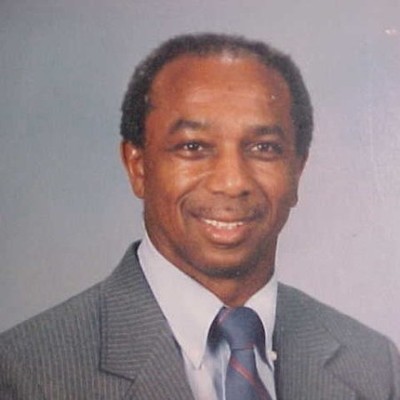Engineering a Life of Service
Electrical engineering caught James Cross’s imagination at an early age, and teachers at his segregated high school in Hampton, Virginia, nurtured that curiosity. He applied only to colleges and universities offering engineering programs and was accepted by several, but the bid from Johns Hopkins was the most generous, offering a sizeable scholarship that was supplemented by the National Scholarship Service & Fund for Negro Students. As one of the first African American undergraduates on the Homewood campus, Cross was often asked why he chose Hopkins. His response: “Hopkins chose me.”
Cross was a busy undergraduate. He played football his freshman year, but it was his prowess on the track team that helped assure continued scholarship funding. He maintained a job in the cafeteria all four years and entered the ROTC program, which provided a reliable income of $22 a month for the first two years and $52 a month the last two years. “Between ROTC and working, I always had some spending change,” he recalls. But, he also admits, “It was very challenging keeping up with my studies. I was tired all the time.” He also recognized needs and found solutions, as he and a classmate had a telephone installed in their room, permitting other students to use it at half the cost of the only pay phone in their dormitory. He similarly collected enough money to purchase a television set for the dorm.
Participation in ROTC meant a two-year commitment for active duty and five years of reserve duty in the US Army. Cross served in a Mapping and Engineering Intelligent Unit at the United States Army Headquarters in Heidelberg, Germany when the Berlin wall was being constructed. He was in charge of a map depot there, with fifty American soldiers and twenty German civilians under his command. His second year was spent at the Engineering Intelligence Center where he evaluated reports and maintained files on all of the bridges in East Germany.
Ten days after leaving Germany, in September 1962, Cross joined the faculty of the relatively new Department of Electrical Engineering at Southern University in Louisiana. Two years later, he became department chairman, a position he held for 27 years. At the same time, he continued his own education at Louisiana State University, becoming the first Black student to receive a master’s degree in engineering there. He notes, “As a Johns Hopkins graduate, I had respect from the faculty when in graduate school. While in graduate school at the University of Florida, I was also listed as a faculty member and while in graduate school at LSU, I was listed as an instructor when teaching a laboratory.”
Cross’s career made a radical turn after frustrating attempts to secure a PhD in electrical engineering at two different universities. “There were no Black students in the engineering PhD programs,” he explains, “and it became quite apparent that I wasn’t going to change that. So, having an interest in religion, I eventually became a student at Christian Bible College of Baton Rouge, earning a bachelor’s, master’s, and a doctorate degree in theology.” Cross has been a part-time member of the faculty there since 1983, where he feels “blessed to be able to teach church pastors.”
Community programs and activities keep Cross involved in a wide variety of concerns. Participation with a Citizen Advisory Board for a Housing and Urban Development community improvement program resulted in an invitation to present a paper at an international housing conference in Saudi Arabia. Cross currently serves on the board of directors of both the Louisiana and the Baton Rouge Councils on Human Relations, and on the Fire and Police Civil Service Board for the City of Baker, Louisiana. “Johns Hopkins,” he says, “prepared me well for a career of service and a life well lived.”
Dr. Cross was selected to participate in the Hopkins Oral History Project. Listen to his interview.
